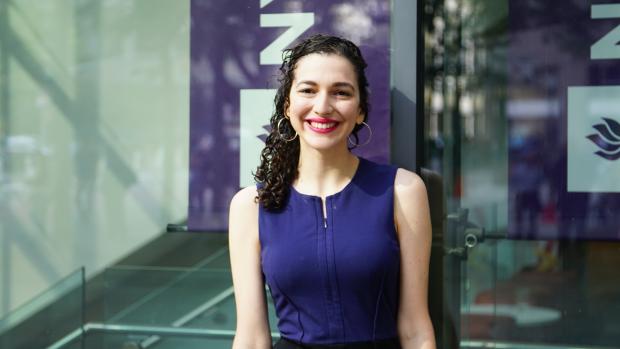Grad student Katie Rosman awarded National Science Foundation Fellowship

Graduate student Katie Rosman won an NSF Fellowship for her work using data science to make a social impact
Master’s degree candidate Katie Rosman is fond of a line of advice from Teddy Roosevelt: “Do what you can, with what you have, where you are.” Her mother, a social worker, had posted the quote on a mirror, so that Rosman would be reminded while growing up that at any moment of any day, she could use her skills and talents to make the world a better place.
Rosman relayed that anecdote in her application for a National Science Foundation (NSF) Graduate Research Fellowship — the oldest fellowship program of its kind and one with a remarkable track record of accurately identifying recipients who go on to achieve high levels of academic and professional success. (Past fellows include numerous Nobel Prize winners, Google founder Sergey Brin, and Freakonomics co-author Steven Levitt.)
While the honor typically goes to doctoral candidates, NSF officials were sufficiently impressed by Rosman’s fierce determination to make a social impact and her work as a data scientist to grant her the fellowship, which comes with a generous three-year stipend, cost-of-education allowance, and plethora of opportunities for international research and professional development.
Not too long ago, the idea that she could win an award meant for scientists and technologists would have seemed farfetched to Rosman. Her bachelor’s degree, which she earned from Stanford University in 2013, was in Public Policy and African-American Studies, and she had focused her attention on such topics as racial inequalities in urban school districts and barriers to employment faced by people with criminal records. Her award-winning honors thesis was one of the first academic explorations of job search challenges among adults living in transitional shelters. In working on those and other projects, she began realizing the vital role that technology could play in both informing policy and strengthening the effectiveness of public institutions.
“I had always conceptualized technology as an important tool for start-ups and businesses, but as I gained more exposure to pressing challenges facing our society, I began to understand that technological innovation could also serve as a powerful force for social good,” says Rosman. “And I wanted to become part of that movement. The only problem was, I had essentially zero technical experience.”
Undeterred, Rosman vowed to develop the expertise necessary to work in data science, an emerging field at the intersection of computer science and statistics. By day, she joined the New York City mayoral administration, helping to create and implement a $10 million portfolio of economic development programs. At night and on weekends, however, she dedicated herself to learning how to code and trained to become a data scientist. Rosman pursued a variety of approaches to build up her technical skills, including attending multiple coding boot camps, engaging in rigorous self-study, and taking part in hackathons and machine learning competitions.
In 2016 she was hired as a data scientist by the New York State Attorney General’s office as part of the Research and Analytics Department. There she worked on cases in a variety of fields, including civil rights, consumer fraud, and healthcare, and specialized in novel applications of machine learning techniques. Her technical analysis played a key role in the agency’s settlement with a Brooklyn-based auto dealership for discrimination against non-English speaking customers, as well as the agency’s $65 million settlement with Wells Fargo for fraudulent statements the company made to investors. She also worked on the agency’s case against Insys Therapeutics, helping to uncover the drug company’s practice of bribing health care providers into writing opioid prescriptions. More recently, she served as the lead data scientist for the agency’s landmark lawsuit against 10 opioid manufacturers and distributors, designing an analytical framework that exposed the defendants’ failure to prevent illicit diversion of prescription opioids for years on end.
Rosman took great pride in her work, but because of the confidential and ongoing nature of the Attorney General’s investigations, her technical advancements were generally restricted to applications within the agency. She longed to collaborate with other government groups and share her code publicly, and realized that returning to academia could provide a pathway to achieving that vision.
She is now studying under NYU Tandon Associate Professor of Urban Analytics Daniel B. Neill, whose lab is devoted to developing innovative machine learning methods that are directly applicable to critical real-world problems, including preventing opioid overdoses, mitigating health disparities caused by environmental factors, and ensuring that the algorithmic systems used to make bail and parole decisions are just and equitable.
Rosman may no longer have that Roosevelt quote taped to her mirror (“I have since switched to Beyoncé,” she says), but she still thinks every day about the importance of making a difference. A reminder is built right into the name of Neill’s lab: Machine Learning for Good (ML4G).





